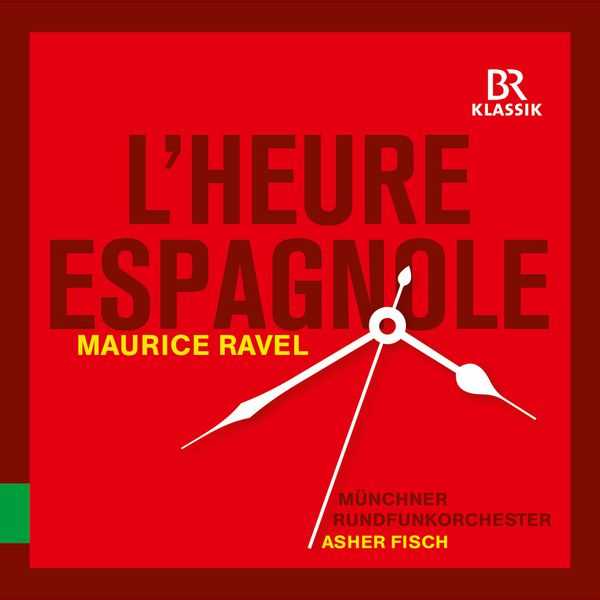

Composer: Maurice Ravel, Emmanuel Chabrier
Performer: Gaëlle Arquez, Julien Behr, Mathias Vidal, Alexandre Duhamel, Lionel Lhote
Orchestra: Münchner Rundfunkorchester
Conductor: Asher Fisch
Format: FLAC (tracks)
Label: BR Klassik
Catalogue: 900317
Release: 2017
Size: 549 MB
Recovery: +3%
Scan: yes
Ravel: L’heure espagnole, M. 54
01. Introduction
02. Señor Torquemada, horloger de Toléde?
03. Totor!
04. Il reste, voilà bien ma chance!
05. Il était temps, voici Gonzalve!
06. C’est fait, l’horloge est à sa place
07. Maintenant pas de temps à perdre!
08. Salut à la belle horlogère!
09. Voilà!… Et maintenant à l’autre!…
10. Évidemment, elle me congédie
11. Voilà ce que j’appelle une femme charmante
12. Monsieur, ah! Monsieur!
13. Enfin, il part!
14. Voilà l’objet! Que faut-il que j’en fasse?
15. Ah! Vous, n’est-ce pas, preste!
16. En dépit de cette inhumaine
17. Voilà ce que j’appelle une femme charmante
18. Oh! La pitoyable aventure!
19. Voilà!… Et maintenant, Señora, je suis prêt
20. Mon oeil anxieux interroge
21. Il n’est, pour l’horloger, de joie égale
22. Pardieu, déménageur, vous venez à propos!
23. Chabrier: España
The thought of Spain filled many French composers of the 19th and early 20th century with musical yearning – one has only to think of Georges Bizet’s opera “Carmen”, Maurice Ravel’s “Rhapsodie espagnole” (1907), or his famous “Boléro” (1928). Ravel was already inspired by things Iberian in his first work for the stage: “L’heure espagnole” (“The Spanish Hour”), a one-act musical comedy set in Toledo, which premiered in Paris on May 19, 1911. Here he combined fantasy and comedy in the action with “spoken music” full of local Spanish colour. The short opera ends, for instance, with a fiery habanera. Ravel masterfully and wittily integrates the clocks chiming in the workshop of clockmaker Torquemada into the score, together with the sound of their ticking, and of all kinds of chimes or mechanical music machines producing cuckoo calls when striking the hour. Emmanuel Chabrier’s rhapsody for orchestra with the promising title of “España” was composed in 1883 and premiered in Paris. The music was inspired by a Spanish journey that Chabrier had undertaken the year before, during which he had noted down many original motifs and rhythms. Spanish folklore is ever-present; in addition to the melodies, it is above all the rhythmic motifs and movement patterns that, when combined, achieve a complexity that was still unknown in art music at that time. A magnificently rousing dance piece in rapid triple time.
A concert performance of the two works took place on April 24, 2016 as part of the “Sonntagskonzerte” (Sunday Concerts) series in Munich’s Prinzregententheater, and can now be experienced on CD. Ravel’s opera (in its original French-language version) is interpreted by young soloists, all of them entirely at home in the Franco-Spanish oeuvre; they are accompanied by the Munich Rundfunkorchester under the direction of Asher Fisch.
Recorded live in April 2016 at the Prinzregententheater in Munich with the Bavarian Radio Orchestra, this new rendering of Ravel’s L’Heure espagnole boasts, above all, an exemplary cast with only native French-speaking singers – four Frenchmen, Gaëlle Arquez as Concepción, Julien Behr as Gonzalve, Mathias Vidal as Torquemada, Alexandre Duhamel as Ramiro – and the Belgian Lionel Lhote singing Don Iñigo Gomez. In other words, and this is not such a frequent occurrence, the happy listener will be able to hear the work sung by a marvelously youthful cast with perfect experience and a totally impeccable French pronunciation, as well as an insiders’ understanding of the libretto’s gallic essence. This is a recording that ranks very high amongst the best recordings of Ravel’s masterpiece.